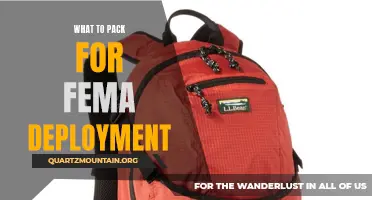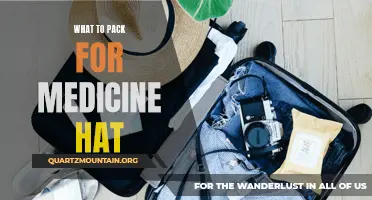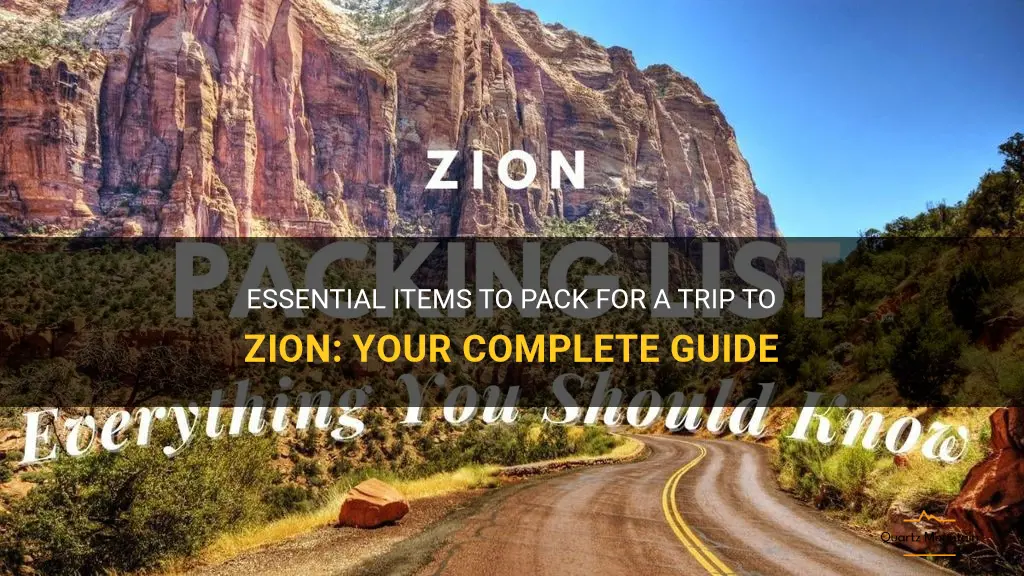
Are you planning a trip to Zion National Park? Whether you're a seasoned traveler or a first-timer, it's always important to pack the right essentials for your adventure. From hiking gear to camping equipment, there are certain items that are a must-have for any trip to Zion. In this complete guide, we'll walk you through everything you need to know about the essential items to pack for a trip to Zion. So get ready to explore one of the most beautiful national parks in the United States, all while being prepared for any adventure that comes your way.
What You'll Learn
- What are the essential items to pack for a trip to Zion National Park?
- What kind of clothing should I pack for different activities and weather conditions in Zion?
- Are there any specific gear or equipment recommendations for hiking or camping in Zion?
- Is there any special food or snacks that are recommended for a trip to Zion?
- Are there any specific safety precautions or items that should be included when packing for a trip to Zion?

What are the essential items to pack for a trip to Zion National Park?
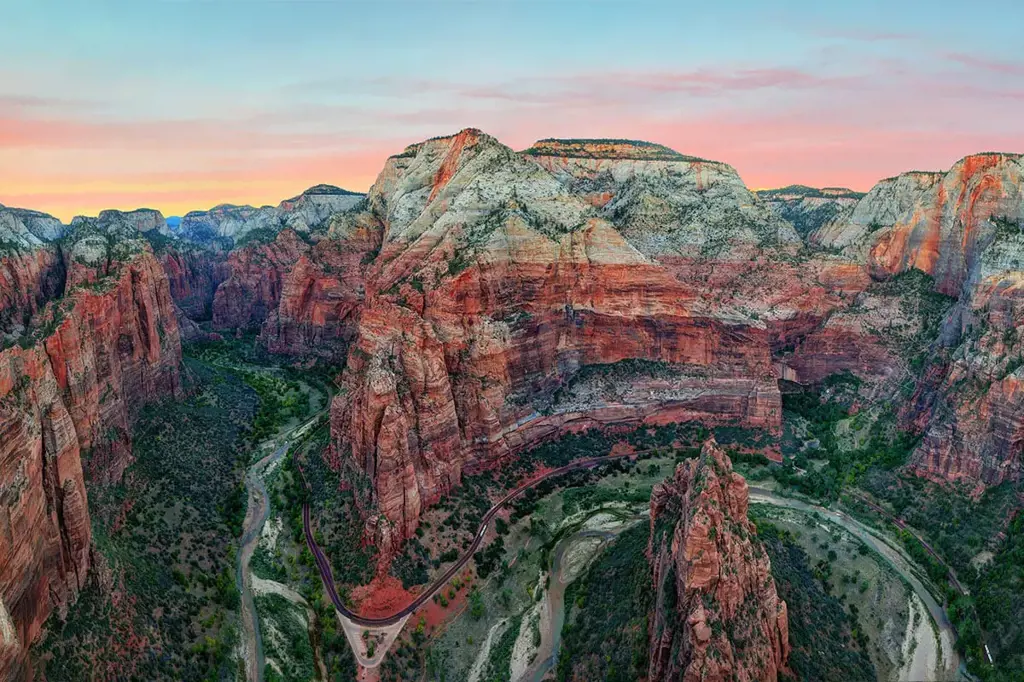
Zion National Park, located in southwestern Utah, is a stunning natural wonder known for its towering red cliffs, deep canyons, and diverse wildlife. If you're planning a trip to this beautiful park, it's important to pack the right essentials to ensure a comfortable and enjoyable experience. Here are some essential items you should consider packing for your trip to Zion National Park:
- Hiking Gear: As Zion National Park is a hiker's paradise, it's crucial to pack proper hiking gear. This includes sturdy hiking boots, breathable and moisture-wicking clothing, a hat to protect against the sun, a backpack to carry essentials, and a good pair of hiking socks to keep your feet comfortable.
- Water Bottles and Hydration Pack: Staying hydrated is essential, especially when exploring the desert landscapes of Zion National Park. Pack multiple water bottles or a hydration pack that allows you to drink water on the go. There are various refill stations available within the park, so carrying a reusable water bottle is also an eco-friendly choice.
- Sun Protection: The desert sun can be intense, so it's essential to pack sun protection items such as sunscreen with a high SPF, sunglasses, and a wide-brimmed hat. Don't forget to apply sunscreen regularly, especially during midday when the sun is at its strongest.
- Map and Compass: While Zion National Park offers well-marked trails, it's always a good idea to carry a map and compass to navigate your way. Cell phone service can be limited in the park, so these traditional navigation tools can come in handy in case of emergencies or if you wander off the main trails.
- First Aid Kit: Accidents can happen during outdoor adventures, so it's crucial to have a basic first aid kit on hand. Include items such as band-aids, antiseptic wipes, blister pads, pain relievers, and any necessary prescription medications.
- Snacks/Energy Bars: Exploring Zion National Park can be physically demanding, and having snacks or energy bars on hand can provide a quick boost of energy when needed. Choose snacks that are lightweight, non-perishable, and provide a good balance of carbohydrates, proteins, and healthy fats.
- Binoculars and Camera: Zion National Park is home to a diverse range of wildlife and breathtaking landscapes. Capture those incredible moments by packing a camera and a pair of binoculars. Binoculars are particularly useful for spotting birds and other wildlife that may be farther away.
- Layers of Clothing: The weather in Zion National Park can vary greatly throughout the day, with hot temperatures during the day and cooler temperatures in the evening. Pack layers of clothing that can be easily worn or removed as needed. This includes a lightweight jacket, long-sleeve shirts, and pants that can be converted into shorts.
- Insect Repellent: Zion National Park is home to various insects, including mosquitoes and flies. Protect yourself from bug bites by packing insect repellent with a high concentration of DEET or other effective active ingredients.
- Camping Gear (If Applicable): If you plan on camping in Zion National Park, don't forget to pack your camping gear, including a tent, sleeping bag, camping stove, food storage containers, and other necessities. Check the park's regulations and guidelines for camping to ensure you have all the required equipment.
By packing these essential items, you'll be well-prepared for your trip to Zion National Park. Remember to always check the park's website for any specific guidelines or recommendations before your visit. With the right gear and preparation, you can have an unforgettable adventure in this stunning national park.
Essential Items to Pack for Your Tbilisi Adventure
You may want to see also

What kind of clothing should I pack for different activities and weather conditions in Zion?
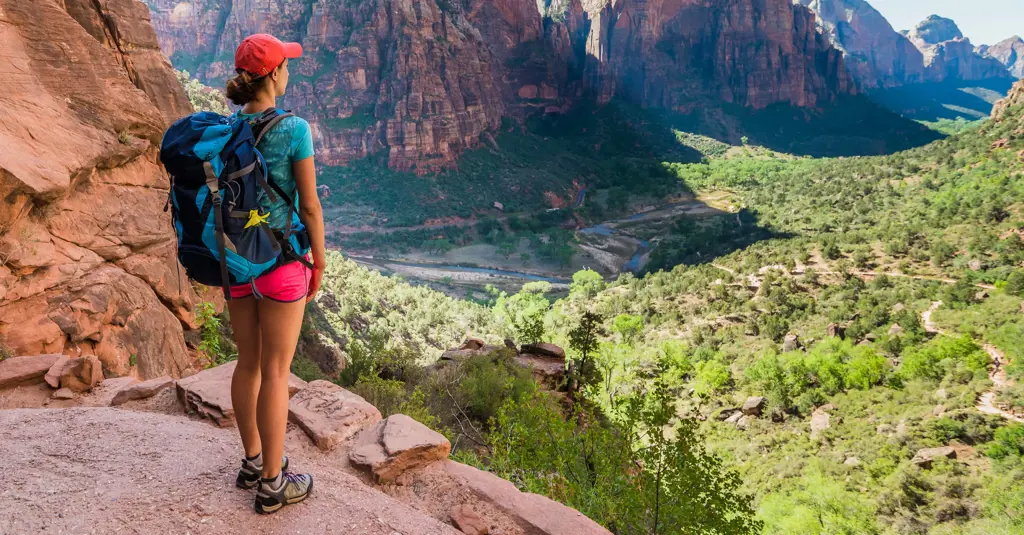
When packing for a trip to Zion National Park, it's important to consider the different activities you plan on participating in and the various weather conditions you may encounter. Here is a guide on what kind of clothing to pack for different activities and weather conditions in Zion.
Hiking:
Zion National Park is known for its breathtaking hiking trails, so it's essential to pack appropriate clothing for this activity. Start with a moisture-wicking base layer, such as a lightweight and breathable shirt and pants made of synthetic or merino wool material. This will help keep you dry and comfortable, even if you sweat during your hike. Avoid cotton as it retains moisture and can become uncomfortable when wet.
Next, layer with a long-sleeve shirt or a fleece jacket for added warmth, especially in the mornings and evenings when temperatures can be cooler. Choose a lightweight and packable option that you can easily remove and stow away as you warm up on the trail.
For the bottom layer, opt for quick-drying and moisture-wicking hiking pants or convertible pants that can be zipped off into shorts if the weather permits. Having the flexibility to adjust to changing temperatures is key.
Accessories like a wide-brimmed hat, sunglasses, and sunscreen are also essential for protection against the sun's rays. Additionally, consider packing a lightweight rain jacket or poncho in case of unexpected showers.
Canyoneering:
Canyoneering in Zion National Park can involve wading through water and navigating narrow slot canyons. In addition to the hiking clothing mentioned above, it's crucial to pack appropriate footwear and gear.
Invest in a pair of canyoneering-specific shoes or sturdy hiking boots with good traction and ankle support. Look for shoes that drain water easily and dry quickly, as you will likely encounter wet conditions.
Consider wearing a drysuit or a wetsuit if you plan on canyoneering in colder months or in canyons with high water levels. These suits provide insulation and protection from the cold water.
Camping:
If you're planning on camping in Zion National Park, pack layers that can keep you warm during cool nights and early mornings. Bring a thermal base layer, warm socks, and a fleece or down jacket to provide insulation. You may also want to consider packing a hat and gloves for added warmth.
In addition to warm clothing, don't forget to pack comfortable sleepwear and extra blankets or a sleeping bag suitable for the expected temperature range. It's also essential to bring a waterproof tent and a tarp in case of rain.
General Tips:
Regardless of the activities you plan on participating in, always check the weather forecast before packing and adjust your clothing accordingly. It's also a good idea to bring a small backpack to carry additional layers, snacks, water, and any other essentials you may need.
Finally, remember to pack comfortable and supportive footwear for all your activities, as you'll be spending a lot of time on your feet. Break in new shoes before your trip to avoid blisters and discomfort.
In conclusion, packing the right clothing for different activities and weather conditions in Zion National Park is essential for a comfortable and enjoyable experience. By considering the specific needs of each activity and checking the weather forecast, you can ensure you're prepared for whatever Zion has in store.
Unwind and Relax: A Guide to What to Pack for a Slower Getaway
You may want to see also

Are there any specific gear or equipment recommendations for hiking or camping in Zion?
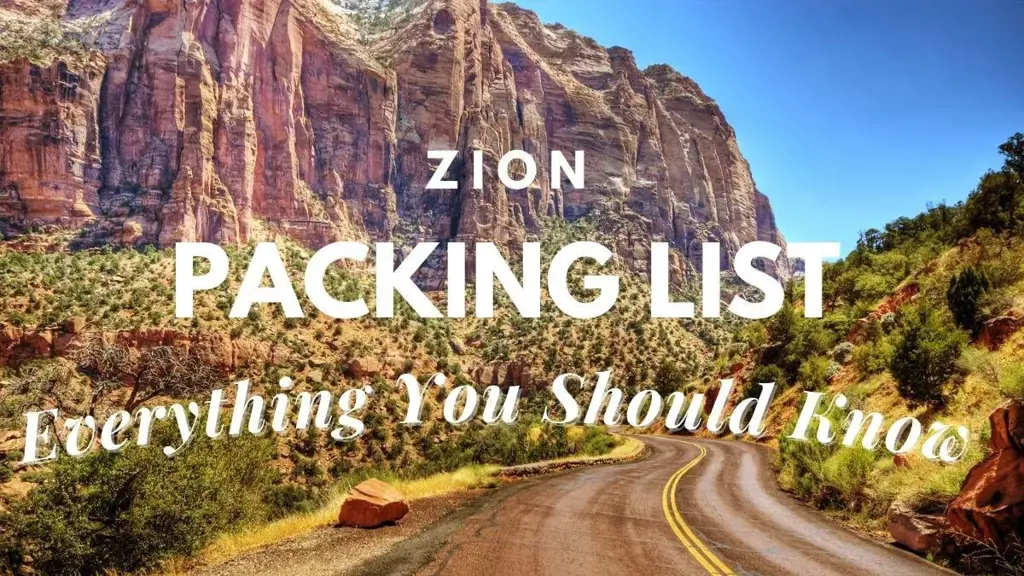
When it comes to hiking or camping in Zion National Park, having the right gear and equipment is essential for a safe and enjoyable experience. The park offers a diverse range of trails and camping options, so it's important to be prepared for the specific conditions you may encounter.
Here are some gear and equipment recommendations for hiking or camping in Zion:
- Hiking boots: A good pair of hiking boots with ankle support is crucial for navigating the rugged terrain of Zion. Look for boots with a sturdy sole and waterproof material to keep your feet dry and protected.
- Backpack: A comfortable backpack is essential for carrying all your gear and supplies on the trail. Look for a pack with padded shoulder straps, a waist belt, and plenty of pockets for organization.
- Layers of clothing: Zion's weather can be unpredictable, so it's important to dress in layers. Start with a moisture-wicking base layer, add a mid-layer for insulation, and top it off with a waterproof and windproof outer layer. Don't forget to pack a hat, gloves, and extra socks!
- Water bottle or hydration bladder: Staying hydrated is crucial in the desert environment of Zion. Pack a durable water bottle or consider using a hydration bladder that fits in your backpack. Make sure to refill it at the park's water stations.
- Navigation tools: Zion offers a variety of trails, so it's essential to have reliable navigation tools. A trail map or guidebook, a compass, and a handheld GPS can help you stay on track and avoid getting lost.
- First aid kit: Accidents can happen, so it's important to have a basic first aid kit on hand. Include items like bandages, antiseptic ointment, pain relievers, and any necessary personal medications.
- Camping gear: If you plan on camping in Zion, you'll need to bring the appropriate gear. This includes a tent, sleeping bag, sleeping pad, and camping stove. Don't forget to check if a permit is necessary for your chosen camping area.
- Lighting: A headlamp or flashlight is essential for navigating the trails in low-light conditions or camping at night. Make sure to bring extra batteries or a portable charger.
- Sun protection: Zion's desert environment means intense sun exposure. Pack sunscreen with a high SPF, sunglasses, and a wide-brimmed hat to protect yourself from the sun's harmful rays.
- Leave no trace supplies: In the spirit of preserving Zion's natural beauty, bring along supplies to minimize your impact on the environment. This may include biodegradable soap, garbage bags for waste, and reusable containers for food.
Remember, these gear and equipment recommendations are just a starting point. Consider the specific trails and camping areas you plan to visit and adjust your gear accordingly. It's always a good idea to research the conditions and talk to park rangers for any additional recommendations specific to your trip.
In conclusion, having the right gear and equipment is crucial for a successful hiking or camping trip in Zion National Park. By being prepared and packing the essentials, you can ensure a safe and enjoyable experience in one of the most stunning natural landscapes in the United States.
Essential Packing Tips for December in Israel
You may want to see also

Is there any special food or snacks that are recommended for a trip to Zion?
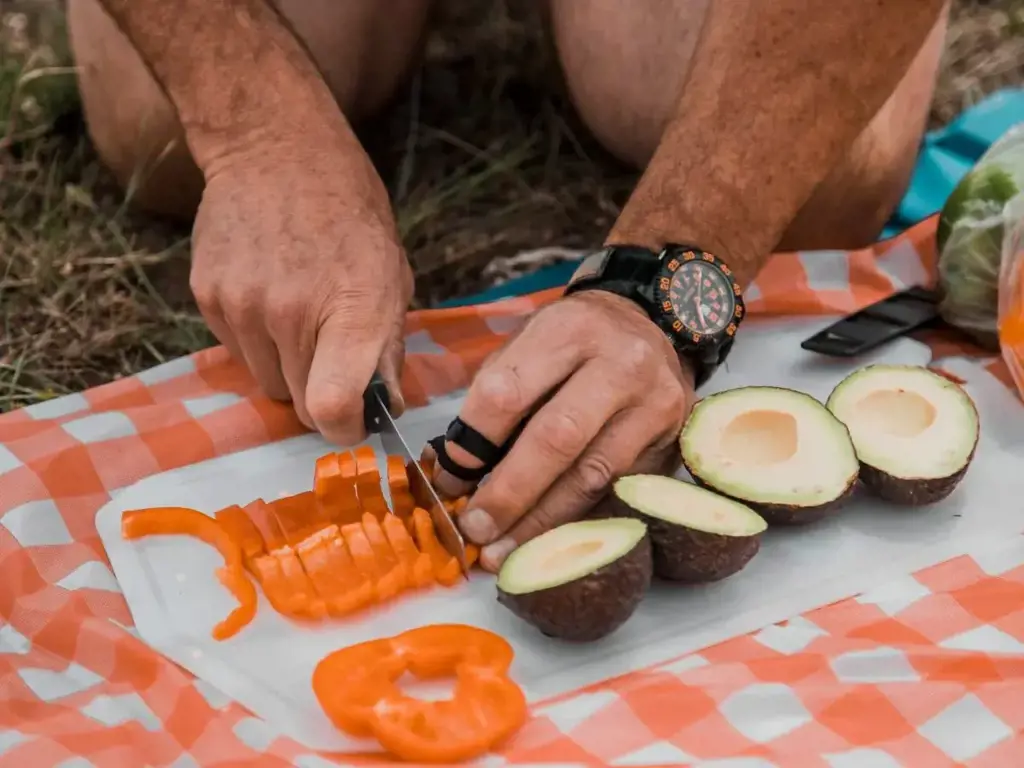
When planning a trip to Zion National Park, it's important to consider the food and snacks you will bring along with you. This will ensure you have enough energy and sustenance during your adventures in the park. While there is no specific food or snack that is recommended exclusively for a trip to Zion, there are several options that are both delicious and convenient for outdoor activities. In this article, we will explore some of these food and snack recommendations for your trip to Zion.
One important consideration when choosing food and snacks for your trip to Zion is portability. Since you will be spending a lot of time on the trails, it is crucial to have lightweight and compact options. This will allow you to easily carry your food with you and minimize the amount of space it takes up in your backpack. Additionally, you'll want to choose foods that won't spoil easily, as there may not be refrigeration available.
Granola bars and trail mix are classic choices for outdoor adventures and make for excellent snacks in Zion. They are easy to pack, provide a good source of energy, and are filled with nuts, dried fruit, and other nutritious ingredients. Look for varieties that are low in added sugar and high in protein and fiber to keep you feeling satisfied throughout your hikes.
Another great option is jerky. Whether it's beef, turkey, or even vegan alternatives, jerky is a high-protein snack that requires no refrigeration and is easy to carry. It can provide a satisfying savory flavor while providing essential nutrients for your body. Just be sure to choose brands that use minimal additives and preservatives.
If you prefer something that requires minimal preparation, consider pre-packaged meals such as dehydrated camping meals or instant noodles. These types of meals only require water to rehydrate, making them convenient for outdoor cooking. They come in a variety of flavors and can provide a hearty meal after a long day of hiking.
When it comes to beverages, it's important to stay hydrated while exploring Zion. Along with water, you may consider bringing electrolyte powders or tablets to replenish your body's electrolyte balance. These can be added to your water bottle to provide a refreshing boost when you need it most.
In addition to these recommendations, it is always a good idea to bring a variety of fresh fruits and vegetables that can withstand the rigors of outdoor activities. Apples, oranges, carrots, and celery are all durable options that provide essential vitamins and minerals. These can be a refreshing break from more packaged snacks and offer a natural and wholesome option.
Ultimately, the best food and snacks for a trip to Zion are those that you enjoy and fit your dietary preferences and needs. It may be helpful to plan out your meals and snacks in advance, considering the duration of your trip and the activities you have planned. This will ensure you have enough sustenance to fuel your adventures and make the most of your time in the park.
In conclusion, while there are no specific foods or snacks that are recommended exclusively for a trip to Zion National Park, there are several options that are convenient, portable, and nutritious. Granola bars, trail mix, jerky, pre-packaged meals, and fresh fruits and vegetables are all excellent choices to consider. Don't forget to stay hydrated and bring electrolyte supplements to replenish your body during your adventures. By planning ahead and packing the right foods, you'll be well-prepared to enjoy all that Zion has to offer.
What to Pack for a 3-Mile Day Hike with a Daypack
You may want to see also

Are there any specific safety precautions or items that should be included when packing for a trip to Zion?
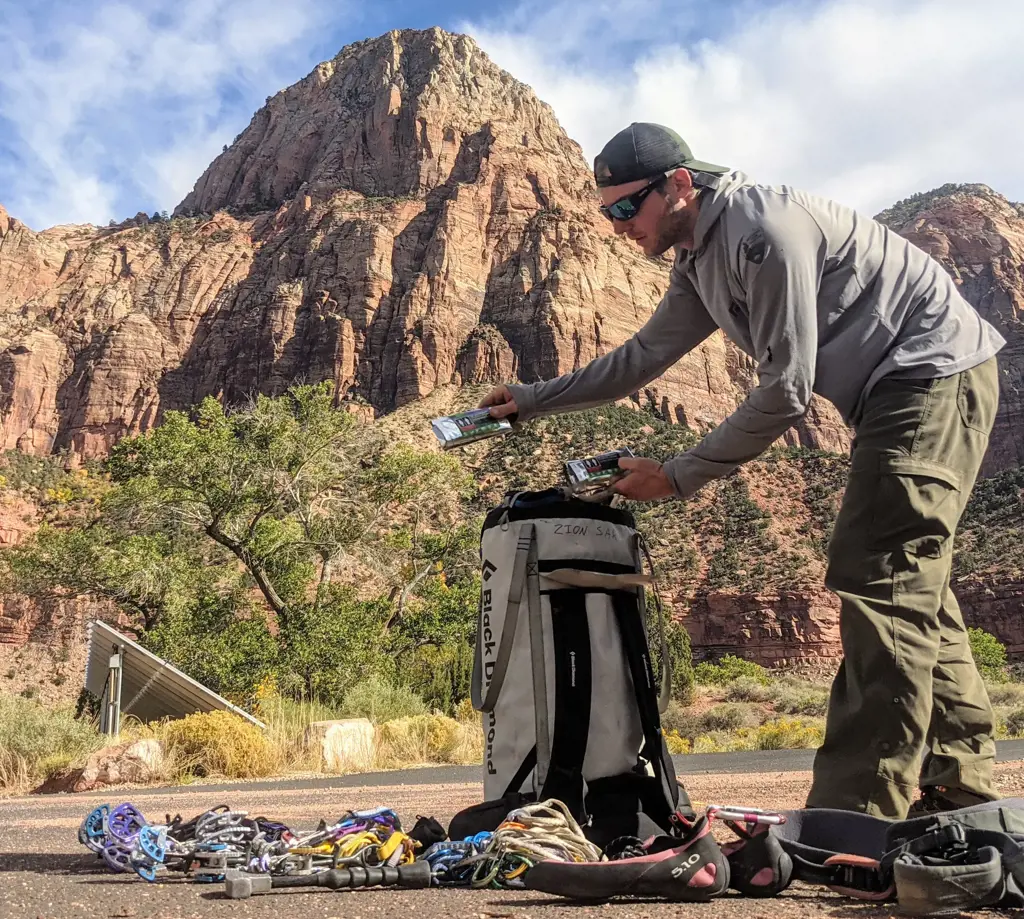
Heading: Essential safety precautions and items when visiting Zion National Park
Introduction:
Zion National Park, located in southwestern Utah, is a magnificent destination for outdoor enthusiasts and nature lovers. With its stunning canyons, breathtaking views, and diverse wildlife, it attracts millions of visitors each year. However, like any wilderness area, safety should always be a priority. When planning a trip to Zion, it's important to take specific safety precautions and pack necessary items to ensure a safe and enjoyable experience.
Research and plan your trip:
Before embarking on your adventure to Zion, it is crucial to research and plan your trip thoroughly. Familiarize yourself with the park's regulations, rules, and safety guidelines. Check the weather conditions and trail conditions to prepare accordingly. This knowledge will help you make informed decisions and avoid potential risks.
Dress appropriately:
The weather in Zion can be unpredictable, so it's essential to dress appropriately for your outdoor activities. Wear comfortable, moisture-wicking, and breathable clothing suitable for the weather conditions. Layer your clothing to accommodate temperature changes throughout the day. Don't forget to wear sturdy, well-fitting shoes or hiking boots to protect your feet and provide better traction on uneven terrain.
Carry plenty of water:
Staying hydrated is crucial when exploring Zion National Park, especially during hot summer months. Carry an adequate amount of water to prevent dehydration. The park recommends drinking at least one gallon (3.8 liters) of water per person per day. Consider investing in a hydration backpack or water bladder for easy access to water while on the trails.
Pack essential safety items:
To enhance your safety while exploring Zion, make sure to pack the following items:
- Map and compass: Even though the park has well-marked trails, it's wise to carry a map and compass as a backup navigation tool. Familiarize yourself with the map before setting out and use it to stay on track.
- First aid kit: Accidents can happen, so carrying a first aid kit is essential. Include items such as bandages, antiseptic ointment, pain relievers, blister pads, and any necessary prescription medications.
- Sun protection: Zion's high elevation and intense sun exposure require proper sun protection. Pack sunscreen with a high SPF rating, sunglasses, a wide-brimmed hat, and lightweight long-sleeved shirts and pants to shield your skin from harmful UV rays.
- Insect repellent: Zion is also home to mosquitoes and other biting insects, particularly in marshy areas. Bring insect repellent to protect yourself from bites and potential diseases.
- Emergency whistle and signal mirror: These items are essential for attracting attention in case of an emergency or getting lost. The high-pitched sound of a whistle can carry farther than the human voice, while a signal mirror can catch the attention of rescue teams or other hikers.
- Snacks and food: Pack high-energy snacks like trail mix, energy bars, and fresh fruit to maintain your energy levels throughout your expedition. If you plan to hike for an extended period, consider bringing meals that are easy to prepare and high in nutrients.
When visiting Zion National Park, taking appropriate safety precautions and packing necessary items can greatly enhance your experience while ensuring your safety. By researching and planning your trip, dressing appropriately for the weather, carrying enough water, and packing essential safety items, you can confidently explore this stunning natural wonder. Remember to respect the park's rules and guidelines, be aware of your surroundings, and always prioritize your safety while enjoying the beauty that Zion has to offer.
Essential Items to Pack for a Memorable Trip to Ethiopia
You may want to see also
Frequently asked questions
When packing for a trip to Zion National Park, it is important to consider the weather and activities you will be participating in. The park experiences a wide range of temperatures, so it is important to bring layers for fluctuating weather conditions. Additionally, comfortable and sturdy footwear is essential for hiking the park's trails. Be sure to pack sunscreen, a hat, and sunglasses to protect yourself from the sun. Other items to consider include a refillable water bottle, a map or hiking guide, and a backpack to carry your essentials while exploring the park.
For most of the hiking trails in Zion National Park, you do not need any special equipment. However, it is highly recommended to bring sturdy hiking boots or shoes with good traction to navigate the rocky terrain. Hiking poles can also be helpful, especially for more challenging trails or if you have any knee issues. Additionally, it is important to have a good daypack or backpack to carry water, snacks, and any necessary supplies. If you plan on hiking in the park during the winter months or at higher elevations, be sure to pack extra layers and possibly traction devices for your shoes in case of icy or snowy conditions.
If you are planning a camping trip in Zion National Park, there are a few specific items you should include in your packing list. First and foremost, make sure to bring a tent, sleeping bags, and sleeping pads for a comfortable night's rest. You will also need a camping stove or grill, cooking utensils, and food supplies. It is important to remember to pack all necessary toiletries, towels, and personal items. Additionally, bring appropriate clothing for camping, including warm layers for cooler nights and comfortable clothes for hiking during the day. Don't forget essential camping gear such as a flashlight, a first aid kit, and bug spray.




